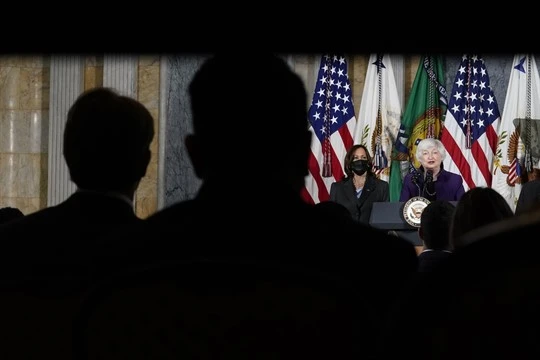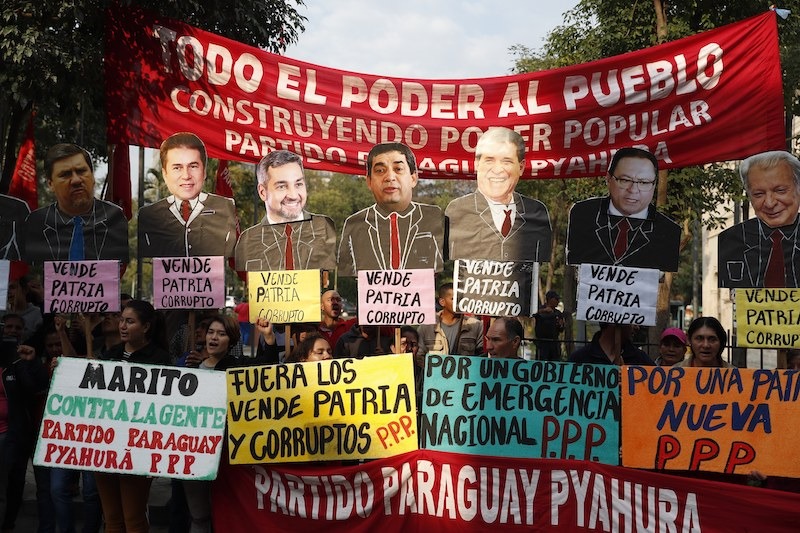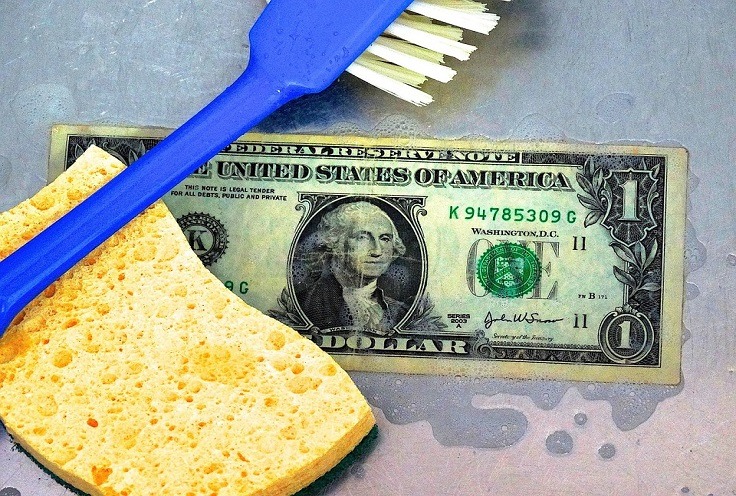By Emanuele Ottolenghi for World Politics Review U.S.
When It Comes to Money-Laundering, the U.S. Is Part of the Problem
On Oct. 3, the International Consortium of Investigative Journalists released 11.9 million confidential files, known as the Pandora Papers, that documented how world leaders, oligarchs and business elites park their wealth in offshore jurisdictions. Like the Panama Papers of 2016, this new leak brought shell companies and offshore jurisdictions under intense public scrutiny for their role in helping the rich and powerful evade taxes and ignore the transparency requirements by which their fellow citizens and competitors must abide.
What was perhaps most damning was the inclusion of five U.S. states—South Dakota, Florida, Delaware, Texas and Nevada—among the list of favored offshore jurisdictions. In these places, vast fortunes are sheltered in the United States under a blanket of secrecy, even as U.S. politicians regularly chastise Switzerland, the Cayman Islands and others for their lack of transparency.
Months before the Pandora Papers’ release, the United States, led by President Joe Biden, took steps toward recognizing its role in international corruption. In June, Biden officially established combating corruption as a “core national security interest,” directing the National Security Council to conduct an interagency review and promulgate an all-of-government anti-corruption strategy. The directive included a historic recognition of the United States’ transparency gaps and responsibility to address them. But it, too, still presents offshoring as mainly a foreign problem. To the contrary, it is also an urgent domestic matter.
To illustrate the extent to which global money laundering networks and corrupt foreign officials depend on access to the U.S. financial system, it’s useful to look at one country in particular: Paraguay. For decades, Paraguay has been a key money laundering and terror finance hub, and addressing corruption has long been a top priority of the United States’ work there. Despite those efforts, the Pandora Papers implicated an “unprecedented” number of Paraguayan elites in headline-grabbing scandals, including former President Horacio Cartes and current first lady Silvana Lopez Moreira. And the parked wealth of these elites pales in comparison to the proceeds of money laundering schemes that operate out of the country using U.S.-based front companies.
No matter how much work the U.S. devotes to corruption abroad, the problem will not abate without acknowledging and addressing the fact that the U.S. is a money-laundering mecca. Anti-corruption efforts will need to tackle the foreign and domestic aspects of these crimes with equal vigor.

he Holes in the U.S. Financial System
According to the 2020 Financial Secrecy Index, the U.S. now ranks as the second-worst jurisdiction worldwide in terms of enabling criminality via “secretive banking, anonymous shell company ownership, anonymous real estate ownership or other forms of financial secrecy.” Its laws include loopholes that exempt the real estate sector and service providers—like accountants, lawyers and registered agents—from basic anti-money laundering obligations, and do not require all companies to disclose their beneficial owners to the public.
Money launderers frequently direct their commodities through U.S. companies in order to enjoy that corporate opacity and to gain easy access to the U.S. banking system. It’s also comparatively easy in the U.S. to establish companies that, once established, are required to submit few documents to the public record, unlike many European companies, which must annually publish their balance sheets and share the names of their shareholders. Opening a bank account is equally easy. And although U.S. banks generate millions of Suspicious Activity Reports, or SARs, every year, the U.S. regulatory sector is chronically understaffed. That allows suspicious behavior to fall through the cracks, particularly since many companies involved in fraudulent schemes move money around using bank wire transfers, rather than relying on lines of credit, which would give the bank more oversight and require “know your client” due diligence.
In Paraguay, domestic structural weaknesses combine with loopholes and oversights like these to allow billions of dollars of dirty money to be laundered by passing through U.S. accounts and businesses each year. Bilateral trade data illustrates the magnitude of these illicit flows. On paper, Paraguay has a huge trade deficit with the United States. In 2019, it exported just $162.8 million dollars of products while importing roughly $2.35 billion. But these numbers are skewed by money laundering operations that include U.S.-based companies. Electronics accounted for more than half—$1.49 billion—of imports, most of which were mobile phones, according to Paraguay’s customs records.
In that year, Paraguay recorded declared imports of 8.6 million mobile phones, worth a combined $1.3 billion. For a country of 7.2 million people, that is more than one phone per citizen per year—babies included. These imports are in fact feeding contraband trafficking, tax evasion and money laundering, through elaborate schemes that rely on customs authorities’ collusion and passage through the U.S. financial system.
In August, the U.S. Treasury shed light on how these schemes work when it issued individual sanctions on three Paraguayan individuals—Liz Paola Doldan, Kassem Mohamad Hijazi and Khalil Ahmad Hijazi—for alleged involvement in corruption, tax evasion and money laundering. According to investigators, Doldan had been importing mobile phones from the U.S. into Paraguay, where corrupt customs officials enabled her to declare them as cheaper goods, so that she could pay lower import duties. The scheme generated $675 million.
Separately, Kassem Mohamad Hijazi was sanctioned for using his cousin Khalil’s companies to import electronics into Paraguay in coordination with suppliers based in the U.S. and China, in order to “avoid taxation and to launder money through their importation.” According to the Treasury, Kassem guaranteed smooth operations by bankrolling a corrupt network of political and administrative contacts.
The fact that these sanctions were imposed under the Global Magnitsky program, which aims to address international human rights abuses and corruption, gives the impression that the Paraguayan cases are part of an overseas problem. Yet these schemes relied heavily on U.S. companies and the U.S. financial system in order to achieve their nefarious goals.
Paraguay’s Endemic Challenges
To be sure, the challenges to accountability and transparency within Paraguay are significant. Despite having one of the strongest economies and most stable political systems in Latin America, Paraguay continues to struggle with systemic corruption. The issue is so endemic that it accounts for a projected loss of as much as 25 percent of foreign direct investment into the country, a staggering figure. Pervasive corruption has incentivized organized crime groups and terrorist organizations to converge on the country’s territory, turning its borderlands into a hub for money laundering, drug trafficking and terrorism financing.
This region—known as the Tri-Border Area of Argentina, Brazil and Paraguay, or TBA—has an “attractive and permissive financial environment” that has produced “a large volume of transfers to high-risk jurisdictions,” according to the U.S. Treasury. The region’s numerous unregistered money exchange houses, cash-intensive economy and poor local corruption-prevention efforts create the perfect environment for trade-based money laundering schemes. In many cases, these illicit networks operate by importing and exporting goods across the porous borders in coordination with retail businesses, mainly in the electronics and automotive sectors.

Corruption in the TBA, and in the rest of Paraguay, has become so entrenched in large part because the country’s judicial system is effectively for sale. Courts have repeatedly stymied money laundering investigations by local prosecutors. Many of these stalled cases have implicated not only the local business community, but also powerful political players, who likely guaranteed their co-conspirators impunity in exchange for bribes, campaign money or both.
Back in November 2016, Paraguayan authorities raided dozens of companies after they were implicated in an alleged money laundering scheme worth $1.6 billion. The corrupt venture, which was aptly named the Megalavado, or “mega-laundry,” allegedly laundered money through commodities sales mainly in the TBA. The case files, which I obtained from a confidential source in the local intelligence community, show that Megalavado companies were routinely importing Chinese merchandise through multiple U.S. intermediaries, many of which were based in Florida—including one that was convicted by U.S. courts in 2011 for violating export controls.
Unfortunately, constant political meddling has stalled law enforcement investigations of the Megalavado for five years now. In particular, the case has had to endure periodic changes of the assigned prosecutors—sometimes ordered by the attorney general’s office—each of which sets the case back. In the meantime, the Megalavado has allegedly continued to operate through new companies, many of which appear to involve partnerships with government-appointed senior officials, based on the country’s commercial registry.
To make matters worse, individuals implicated in corruption scandals may not even face reputational damage or a loss of political power. For instance, Ulises Quintana, a congressman sanctioned by the Biden administration in April, recently ran for mayor in Ciudad Del Este, the epicenter of illicit finance activities in the TBA, as the ruling party’s candidate. A local criminal case against him in addition to the U.S. sanctions were not enough to disqualify his candidacy, nor to compel his party’s leadership to disown him. (Quintana lost the election but retains his legislative seat.)
At times, when police protection, judicial impunity and political access have allowed corrupt networks to continue to operate in Paraguay, the U.S. has opted for sanctions and turned to its own judicial system. The Treasury’s decision to sanction Doldan in August, for instance, came after two years of inaction by Paraguay’s judiciary. Doldan seemed poised to get away with a tax fine, despite the staggering revenue losses Paraguay’s treasury incurred as a result of her tax evasion scheme. The U.S. sanctions were another signal to Paraguay that its widespread corruption would not go unchecked.
Yet similar U.S. efforts have not made much of an impact on Paraguay’s corrupt networks. The U.S. case against Nader Mohamad Farhat—a Brazilian-Lebanese dual national believed to be running one of Latin America’s largest money laundering networks for drug-trafficking proceeds—began with his arrest in 2018 but was quickly stymied by a yearlong extradition battle. Three years later, it has yet to go to trial, partly because the treasure trove of evidence initially seized in the May 2018 raids on his home is slowly yielding more indictments. All the while, the intricate web of Paraguayan companies that allegedly relied on Farhat’s money exchange services remains operational and unencumbered by judicial proceedings.
U.S. efforts in response to the Megalavado case have so far been limited to denying U.S. visas to those implicated in the investigation, but that has also failed to put an end to corruption within that network. Despite the clear concern in the U.S. about the lack of judicial progress in Paraguay, there are to date no indictments against the scheme’s suspected culprits in the U.S., and no sanctions against network members or those they bribed for political cover.
What the U.S. Can Do
The U.S. has no doubt secured important achievements in its fight against organized crime, money laundering and corruption. Its prosecutions, if successful, will at least temporarily disrupt the targeted networks and put culprits behind bars. However, those successes are diminished by the ease with which organized crime networks continue to gain access to the U.S. financial system.
This shortcoming can be addressed with a two-fold approach. First, U.S. legislators and regulators must close the loopholes that create a secretive financial environment in some U.S. states and push for corporate transparency. Company records on shareholders and beneficiaries must be public and fully accessible across the 50 states. Meanwhile, service providers and the real estate sector should face due diligence responsibilities, lest they unwittingly become complicit in money laundering schemes. Luckily, U.S. Congress already has draft legislation in the works—aptly titled the Enablers Act—to address this last point.
Second, the judicial system must inflict tougher penalties on white-collar criminals. Money launderers too often face only mild sentences. And although banks, when they fail in their due diligence, endure billion-dollar fines, that is often negligible for such large institutions. Putting bank executives behind bars and suspending banking licenses would be much harder to brush off. Federal agencies like the Treasury’s Financial Crimes Enforcement Network, or FinCen, should hire more compliance personnel to give their efforts more muscle.
Beyond these regulatory steps, the Biden administration needs to make better use of sanctions, travel bans and asset freezes. A serious U.S. strategy to combat global corruption will require dramatically expanding the scope of its sanctions against corrupt political elites, rather than sticking to symbolic reproaches. The State Department can also use its power to deny visas more expansively, and should publicize these decisions to maximize their impact in countries like Paraguay, where travel to the U.S. is a status symbol.
Beyond that, the U.S. can also leverage more of its geopolitical influence. The regional anti-money laundering initiative GAFILAT, for the Financial Action Task Force of Latin America, is currently conducting a “mutual valuation”—essentially an independent audit—of Paraguay’s efforts to curb money laundering and terror financing. If it concludes that Paraguay’s financial system remains vulnerable to these criminal activities and that its government has failed to meet acceptable standards of prevention because of corruption and political influence-peddling, the country’s international credibility and its economy would suffer a major blow. The U.S. has observer status in GAFILAT and is a prominent member of its parent organization, the global Financial Action Task Force. It can use its influence to facilitate a punishing outcome for Paraguay, which would in turn force that country’s leadership to face pariah status or choose transparency over corruption.
The Pandora Papers have put a spotlight on global corruption once again, and the U.S. is part of the solution—but also part of the problem. The Biden administration should show its true commitment to fighting corruption by both stepping up its efforts against illicit financial networks based in Paraguay and elsewhere, and implementing domestic reforms. In the absence of one or the other, the large-scale exploitation of the U.S. financial system is sure to continue.
Emanuele Ottolenghi is a senior fellow at the Foundation for Defense of Democracies, a nonpartisan research institute based in Washington, D.C. Follow him on Twitter at @eottolenghi.







